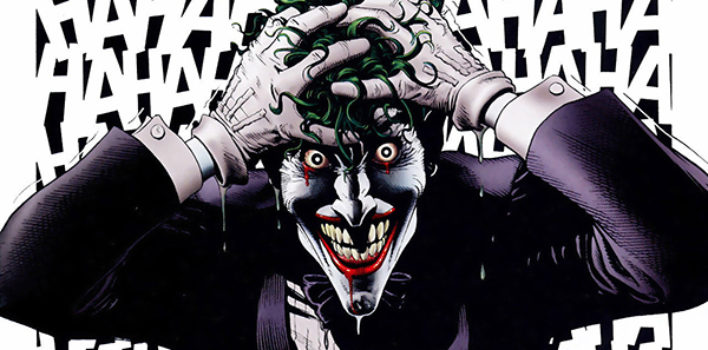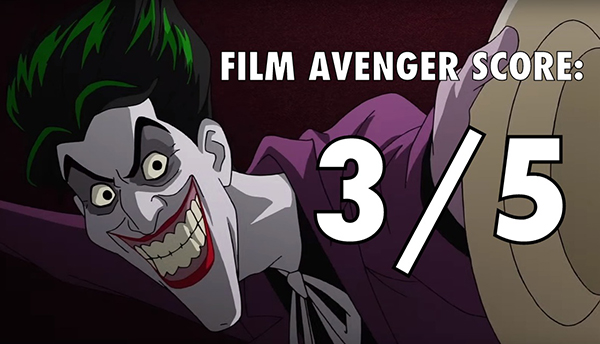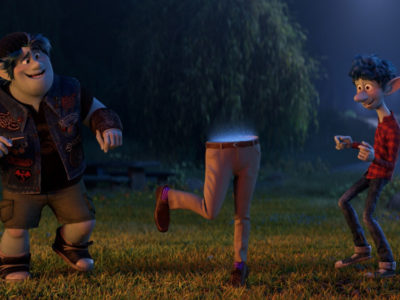Review| Batman: The Killing Joke
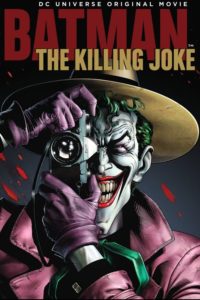 There are very few comic books that had a more profound influence on my pop culture consumption than The Killing Joke. Before I read this book, superheroes were fun and awesome, but I didn’t see them as full, well-rounded characters. The Killing Joke really made me “grow up” in comics. I understood what really good storytelling was all about. My heroes now had feelings and flaws, and actually had introspective thoughts.
There are very few comic books that had a more profound influence on my pop culture consumption than The Killing Joke. Before I read this book, superheroes were fun and awesome, but I didn’t see them as full, well-rounded characters. The Killing Joke really made me “grow up” in comics. I understood what really good storytelling was all about. My heroes now had feelings and flaws, and actually had introspective thoughts.
The Killing Joke has also influenced modern interpretations of both Batman and the Joker. Tim Burton cited it specifically as his favorite comic, and a direct influence on his first Batman film. Christopher Nolan’s The Dark Knight also contains many thematic allusions to this seminal work. And there is a reason for all this: The Killing Joke is simply a masterpiece of storytelling. Writer Alan Moore thrusted these two iconic enemies into a whole new world of understanding, giving them added dimension and pathos.
When I first found out that The Killing Joke was being adapted to animation, I was very excited. Then I learned that the lead characters’ original voices from Batman: The Animated Series, Kevin Conroy and Mark Hamill, would be voicing Batman and the Joker, respectfully, and I was super-excited!
This adaptation, which was released directly on Blu-ray and DVD earlier this month, lives up to its pedigree…when it’s actually adapting the source material. There are also wonderful enhancements placed in the narrative by director Sam Liu and writer Brian Azzarello. However, it also suffers from these same creative people over-thinking their product and adding to the narrative where it really needs nothing else to be sufficient and wonderful.
As a story, what makes The Killing Joke compelling is its thematic subtext. While there is definitely a lot going on, its biggest push is if we truly believe what we believe when we have “one bad day.”
SPOILER ALERT!
Stuff I Liked
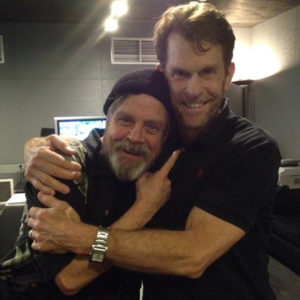 When it adapts the actual Killing Joke comic book story, the film is really wonderful. To see this seminal work brought to life is a treat. The brilliant prose of Alan Moore is thankfully well-preserved, for the most part. Part of The Killing Joke‘s lasting appeal is Moore’s writing – so insightful yet understandable, with layers upon layers of subtext.
When it adapts the actual Killing Joke comic book story, the film is really wonderful. To see this seminal work brought to life is a treat. The brilliant prose of Alan Moore is thankfully well-preserved, for the most part. Part of The Killing Joke‘s lasting appeal is Moore’s writing – so insightful yet understandable, with layers upon layers of subtext.
Dare I say, but there are several instances in which producer Bruce Timm, director Sam Liu and their team at Warner Bros. Animation actually improved the narrative of The Killing Joke. They are slight differences that lend themselves better to a cinematic interpretation. Half of the Joker’s “one bad day” monologue in the funhouse is delivered during a fight with Batman. In the original novel, the Joker delivered it alone in a booth. This change made the monologue visually interesting and much more intense.
Of course the voice talent is amazing. Both Kevin Conroy and Mark Hamill will always be my favorite voices for Batman and the Joker. Watching The Animated Series as a kid, and still reveling in its brilliance today, they are ingrained in my psyche as the quintessential voices for these characters.
Conroy’s vocal quality is perfect for the Dark Knight. It evokes power that can be both restrained and let loose. His voice gets more gravely and intense with his emotion. It also reflects Batman’s tortured humanity.
Mark Hamill is the Joker. He’s mischievous yet lethal, and the voice can turn on a dime unexpectedly. His laugh is also the best Joker laugh – an unsettling cackle that is also strangely amusing. He entertained and terrified me as a child. Hamill is all the best things about every interpretation of the Joker rolled into one.
I’m very glad that both Hamill and Conroy did this at this point in their careers. While the quality of their voices haven’t changed, they have certainly aged. But that’s what this story needed. This is a story about to adversaries who had been clawing at each other for years.
The supporting cast also did a good job, though the powerhouses of Conroy and Hamill do overshadow them. Tara Strong, another holdover from the later seasons of The Animated Series, is still wonderful as Batgirl. I love the youthful quality of her voice. But like the two principals, one can tell that her voice has matured, which again fits well with this story.
Stuff I Didn’t Like
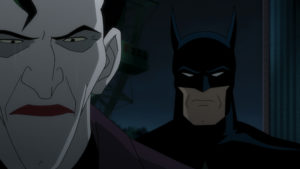 Though the supporting cast did do a good job, some of the voices were lacking. The performances of Conroy, Hamill, and Strong really pointed out the shortcomings of two performers in particular: Ray Wise (Commissioner Gordon) and Robin Atkin Downes (Harvey Bullock). Both of their characters were in The Animated Series, and their original voices are sorely missed here. Sadly, Bob Hastings (Gordon) passed away not long ago. But there wasn’t anything preventing them from tapping Robert Costanzo as Bullock.
Though the supporting cast did do a good job, some of the voices were lacking. The performances of Conroy, Hamill, and Strong really pointed out the shortcomings of two performers in particular: Ray Wise (Commissioner Gordon) and Robin Atkin Downes (Harvey Bullock). Both of their characters were in The Animated Series, and their original voices are sorely missed here. Sadly, Bob Hastings (Gordon) passed away not long ago. But there wasn’t anything preventing them from tapping Robert Costanzo as Bullock.
Visually, The Killing Joke suffers from the same flaw as most of the DC Animated films: stilted animation. I can’t tell if it’s a cost-saving measure or a style choice, but it’s really annoying. Anime has the same styling; it looks like in-between frames are deleted and the movement is not smooth. The only time there is fluid movement is during action scenes, which are wonderfully rendered.
However, the biggest disappointment of this adaptation are the blatantly unnecessary additions made. In order to make The Killing Joke a feature-length film, the crew added a prelude to the events of the original story, which focused on Batgirl. This was a big mistake, and it’s so disappointing that a legend like Bruce Timm, who was a co-creator of The Animated Series, could make such a stupid (yes, stupid) choice. This added material adds nothing substantive to The Killing Joke narrative at all. Even Batgirl herself admits this in the very first line of the film: “First of all, I realize this is probably not how you thought the story would start. Not with a big, shiny moon or a city that could look stunning in spite of itself, or me.”
You know you’re in trouble when one of your main characters admits to the audience that this part of the story is not at all connected to the main story. Whatever goal the filmmakers had were completely lost. The Batgirl narrative has no connection to the events of The Killing Joke aside from the principal characters involved. There’s no set-up, no payoff. Nothing. It’s pure filler.
Strike that. This narrative does add something, but it’s weird, off-putting, and kind of creepy. As the prelude reaches is dramatic height, Batman and Batgirl have a sexual encounter on the roof of a building. And for no real reason. Um, what?!
This changes the relationship between three characters in unnecessary ways. Batman has always treated Batgirl like a daughter or niece, much in the same way as Dick Grayson (Robin). Not only is it because Batgirl has been traditionally much younger than Batman, but that she is also the daughter of Jim Gordon – his most loyal friend in the Gotham City Police Department. I cannot believe that Batman would jeopardize his relationship with Gordon for a fling with Barbara.
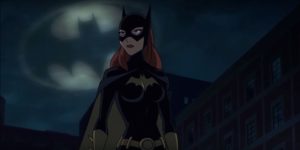 The worst thing is that this very serious, dramatic situation is never, ever addressed or even mentioned in the actual Killing Joke narrative. No resolution is given. Not even an internal dialogue with Batman telling the audience how he feels. So there was no use for it, even in the context of the story they were telling. It’s insulting and beneath the amazing storytelling capabilities of this team. It’s almost as if they needed an even bigger motivation for Batman to go after the Joker – as if the Joker wounding a friend Batman considers practically a daughter isn’t motivation enough.
The worst thing is that this very serious, dramatic situation is never, ever addressed or even mentioned in the actual Killing Joke narrative. No resolution is given. Not even an internal dialogue with Batman telling the audience how he feels. So there was no use for it, even in the context of the story they were telling. It’s insulting and beneath the amazing storytelling capabilities of this team. It’s almost as if they needed an even bigger motivation for Batman to go after the Joker – as if the Joker wounding a friend Batman considers practically a daughter isn’t motivation enough.
If the filmmakers absolutely needed some kind of backstory to the events of The Killing Joke (though I do very much think the strength of the story should have been able to stand on its own, regardless of running time), they probably should have done something more simple. Perhaps Batman following a string of “Joker-type” murders (the grotesque smiling calling card), leading him to believe that the Joker had escaped again; or maybe showing the Joker stalking Barbara to determine when the best time to strike would be.
Lastly, the notion that this film was given a R rating is laughably absurd. There is absolutely no objectionable material in this film that is any different than anything seen in a television show or a comparable theatrical release rated PG-13.
Stuff to Ponder
There’s a lot going on thematically in The Killing Joke. For the sake of brevity, I’m going to explore only one of this story’s many philosophical ruminations. While most Batman/Joker stories involve a crime of greed or random mayhem, what makes The Killing Joke unique in the time in which it was first published was that this particular caper was a crime of philosophy.
As Barbara Gordon lay paralyzed from a gunshot wound, she weakly asked the Joker why he was doing it. “To prove a point,” he said. The point the Joker was attempting to prove was that anyone can have “one bad day” and go crazy. That there is truly no difference between him and Commissioner Gordon psychologically.
“The heart is deceitful above all things and beyond cure. Who can understand it?” -Jeremiah 17:9
In a way, the Joker is actually right. Our human nature and free will gives us the potential to do great evil. None of us are immune to the temptation of sin. In the Book of Romans, the Apostle Paul states that “there is no one righteous, not even one…all have turned away.” (Romans 3:10-12)
Batman (to the Joker): “I spoke with Commissioner Gordon before I came in here. He told me he wanted this done by the book. You know what that means? It means that despite all your sick, cruel vicious little games, he’s as sane as he ever was. So ordinary people don’t crack. Maybe it’s just you.”
However, where the Joker is wrong is where he puts the blame. While he was a victim of both circumstances within and beyond his control, he chose to react the way he did. He lost hope and became a monster. Commissioner Gordon’s reaction represents people that choose to have faith in a system and can fall back on that when tragedy strikes.
The Joker (to Batman): “You silly goose, it’s all a joke! Anything everyone’s ever valued or struggled for! It’s monstrous! Why can’t you see the funny side?! Why aren’t you laughing?!”
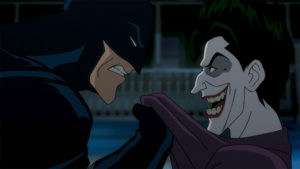 If the world is indeed as the Joker says, there is no use for rules. It’s all a smokescreen to mask who we really are and we should simply embrace it. This is a nihilistic view of the world, where nothing is worth working for or saving. He taunts Gordon and Batman for their adherence to rules and laws that he feels are absurd. Like our spiritual adversary Satan, the Joker invites Gordon to let go of his faith in the system and become like him – supposedly above the system.
If the world is indeed as the Joker says, there is no use for rules. It’s all a smokescreen to mask who we really are and we should simply embrace it. This is a nihilistic view of the world, where nothing is worth working for or saving. He taunts Gordon and Batman for their adherence to rules and laws that he feels are absurd. Like our spiritual adversary Satan, the Joker invites Gordon to let go of his faith in the system and become like him – supposedly above the system.
But we do have something larger than ourselves to hold on to for those “bad days” that will inevitably come – and it’s not a man-made system of laws (though law and order is important). We can put our faith in the God who created us and live with true purpose. When we accept the sacrifice God has made through Jesus Christ, we have the assurance to work past our sinful desires and endure our darkest hours.
So What I’m Trying to Say is…
Taken as a whole, this animated adaptation of The Killing Joke doesn’t truly live up to the pedigree of its source. It contains subplots and scenes that are not necessary, changing character relationships in the process. But what saves it are the vocal performances from two icons of DC animation, as well as the core narrative of The Killing Joke itself. It’s definitely worth a rental if you’re a fan of Batman.
Everyone will have that “one bad day” that will turn their life upside-down. Be it crime, disease, or some other calamity, bad things happen in this world. But faith in God will help make sense of it. The Joker’s world is an empty, pointless existence, where nothing matters and life is just one big joke.
At the end of the film, Batman extends a hand to his adversary, offering to help the Joker come back from the nihilistic worldview he has created for himself. However, the Joker refuses, saying it’s too late for him. But it’s never too late for those who choose to embrace the love of Christ. For only faith in Christ can truly straighten you to endure that “one bad day.”


